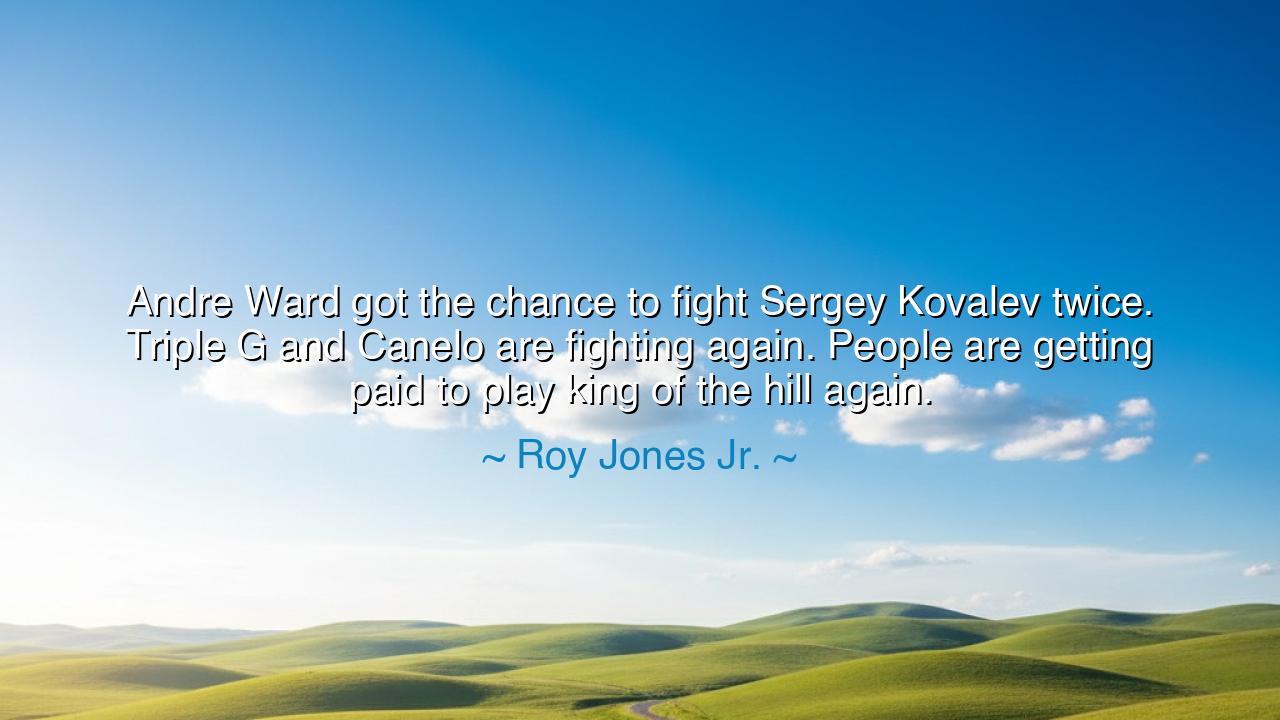
Andre Ward got the chance to fight Sergey Kovalev twice. Triple G
Andre Ward got the chance to fight Sergey Kovalev twice. Triple G and Canelo are fighting again. People are getting paid to play king of the hill again.






In the arena of life, there are moments when the greatest warriors step forth, not just to fight for victory, but to define their legacy. In the words of Roy Jones Jr., we hear an echo of this timeless struggle, one that has been present since the dawn of human conflict: "Andre Ward got the chance to fight Sergey Kovalev twice. Triple G and Canelo are fighting again. People are getting paid to play king of the hill again." These words speak to the ancient battle for supremacy, a contest that has driven men and women to face their greatest fears, to confront their limits, and to prove their worth not just to their rivals, but to history itself.
Roy Jones Jr.'s reflection is not simply about boxing, but about the nature of competition itself. The fighters he mentions—Ward, Kovalev, Triple G, and Canelo—are more than mere athletes; they are the modern-day gladiators, chosen to carry the mantle of greatness in an era where the thrill of combat and the pursuit of the crown never cease. The term "king of the hill" evokes the ancient games and contests, where warriors and champions would fight not just for gold, but for honor, for the recognition that they had proven themselves worthy of the highest prize. In this, Jones speaks to the cycle of rivalry and competition that drives individuals to rise to the occasion, to face their strongest opponents, and to claim their place in the annals of greatness.
Consider, if you will, the great rivalries of the ancient world—the clash between Achilles and Hector, or the fierce battles fought between the Roman legions and the barbarians at the gates. These conflicts were not just battles for territory or power; they were struggles to define what it meant to be truly great. In the heat of battle, the warrior sought not just to defeat his foe, but to prove to the world that he was the one worthy of the crown. Similarly, in the ring, today’s fighters like Ward, Kovalev, Triple G, and Canelo are not just fighting for a paycheck—they are fighting for immortality, for the glory of being remembered as the best to ever step into the ring.
This king of the hill analogy is a reflection of the eternal human desire to be recognized as supreme, to climb to the top of the mountain and stand there, not just as a conqueror, but as a legend. And just as the ancient warriors knew, this title is never guaranteed. It must be earned, and it is constantly under threat from those who seek to claim it for themselves. The challenge is perpetual, and the rise and fall of champions is as much a part of the human story as the fight for survival itself. Jones' words remind us that greatness is not a singular achievement, but a continuous struggle, a cycle of conflict, growth, and resilience.
In the story of Alexander the Great, we see the archetype of the conqueror who sought not just to rule but to define his place in history. With his army, he stormed across continents, defeating kingdoms and empires in pursuit of glory. Yet, even Alexander understood that his reign was not absolute, that every victory was but a step toward securing his place as the greatest. Every new rival, every challenge, was another test of his greatness. Just as Alexander's battles were constant, so too are the challenges faced by the fighters of today. To be a champion is not a momentary thing—it is a state of being, defined by the struggle to remain at the top.
Roy Jones Jr. reminds us that this struggle, this battle for supremacy, is never-ending. Even the greatest will face rivals who seek to knock them off the hill, to take their place. Ward, Kovalev, Triple G, and Canelo are not just competitors—they are part of a legacy, a tradition that goes beyond the sport itself. They embody the eternal fight for dominance, the desire to not just win, but to be remembered as the best. Their fights are the modern manifestation of the ancient struggle—the contest that defines not only the champion, but the very nature of greatness.
And so, my brothers and sisters, let us take heed of this ancient wisdom. Life, much like the ring, is full of challenges, full of moments where we must fight for our place, for our dreams, for our purpose. But remember, like the warriors of old, the struggle is constant. It is not the victory that defines us, but the resilience with which we face each challenge. Like the champions of the ring, we must continue to rise and meet the next challenge, knowing that each fight brings us closer to the legacy we seek to leave behind. In this eternal battle for greatness, let us always strive to climb higher, never faltering, never yielding, as we play our own king of the hill.






AAdministratorAdministrator
Welcome, honored guests. Please leave a comment, we will respond soon